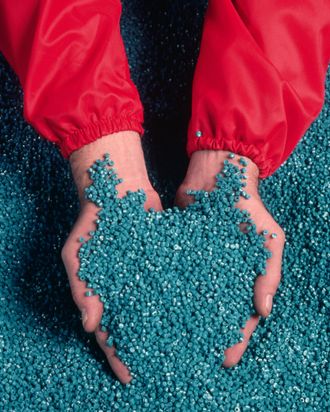
Lately I have been thinking a lot about a meme that entered circulation ca. 2016. “You eat microplastics everyday,” a headline helpfully advises, as if I had asked. “That doesn’t sound like something I would do,” the person retweeting that article remarked, and yeah, me neither. Seven years later, this vintage hit is back in the mix, resurfaced on the rising tide of microplastics memes deluging my various timelines. A second example: The image of a cat — “me” — reared up on its hind legs and clamoring for its birthday dinner, unaware that the dinner will be “microplastics.” Or this one, a stock photo man asking the fishmonger if he can have a plastic bag with his purchase, please. “Oh, it’s already inside!” the fishmonger smiles back, handing over his mackerel. A miracle of modern convenience.
Memes offer excellent shorthand if you are looking to communicate ineffable existential anxiety, and few modern threats epitomize that ambient dread as tidily as microplastics. Widespread plastic mania means that sesame seed-size bits of degraded crap are piling up in the world’s oceans and in its atmosphere; they are present in dust and food and water; no sea turtle can escape them. Fish eat microplastics, and then we eat the fish. Animals excrete microplastics. Humans excrete microplastics. Babies — who love putting plastic in their mouths — excrete the most microplastics of all.
All of that to say: Of course the plastics are infiltrating our bodies at an astounding rate, but nonetheless I am alarmed to read the recent data on the topic. Last month, researchers found microplastics in the blood of 80 percent of subjects in their test pool; this week, scientists found microplastics in the lungs of living people for the first time. The discovery surprised the scientists not because they never expected to find microplastics there — they’ve already turned up in autopsied lung tissue — but because the microplastics embedded themselves in the lower region of the lungs, where one would think the airways are too narrow for the particles to penetrate. Unfortunately, the microplastics appear to be getting smaller, some of these samples measuring .003 mm in size. A separate study suggests that I may be consuming about a credit card’s worth of these little guys every week, which in turn may escalate my risk of developing diabetes, certain types of cancer, and liver disease, simply because I am doing things like drinking water from the tap and breathing.
So the problem, if I am understanding correctly, is that the plastics have always been there — at least for the duration of my lifetime — and I have been unwittingly sponging them up for three decades. I will keep doing it, whether or not I want to: When I get up to make some toast, I will probably ingest traces of its plastic casing along with the butter. When I go out for my brisk and CDC-recommended walk, I will presumably suck up plastic particles of an undetectably teeny size. When I put on my KN95, I will wonder if the mask is filtering out more plastic debris than it is shedding directly into my mouth. Of course there are innumerable ways to die, but somehow I failed to count “body slowly fills with plastic” as one of them.
It’s all a lot to metabolize in the midst of an endless pandemic, with the climate crisis poised to go crashing over its tipping point, and when the Arctic Ocean has chlamydia. Even if my brain were empty, though, the scale of the microplastics problem would swamp its operating capacity. Whatever prophylactic lifestyle changes I might make now — throwing a filter on that tap, vacuuming at a fiendish pace to combat polymer dust, switching to glass — feel small-to-inconsequential when I remember that I have already eaten all this plastic, and will continue to do so whenever I walk outside and inhale the apparently plastic-dusted air. For many reasons, I am distressed at my inability to turn back time, but say the microplastics take me now, at age 32: The approximately 1,664 credit cards already living inside my organs would return to the Earth, or be incinerated into the atmosphere. Further incentive for me to donate my body to science, I suppose. Science will need it.





